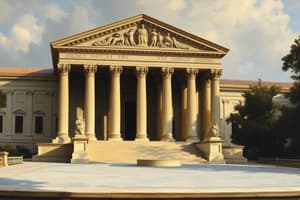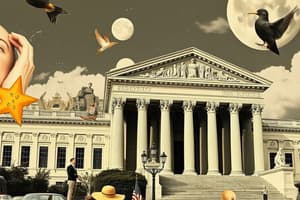Podcast
Questions and Answers
Which principle compels courts to follow precedents set in prior cases when deciding similar disputes?
Which principle compels courts to follow precedents set in prior cases when deciding similar disputes?
- Stare Decisis (correct)
- Judicial Review
- Original Jurisdiction
- Senatorial Courtesy
Which of the following describes the role of the Solicitor General?
Which of the following describes the role of the Solicitor General?
- Nominating federal judges.
- Representing the US government in Supreme Court cases. (correct)
- Conducting impeachment trials.
- Overseeing the administration of all federal courts.
What is the significance of selective incorporation in US constitutional law?
What is the significance of selective incorporation in US constitutional law?
- It extends certain protections from the Bill of Rights to the states through the 14th Amendment. (correct)
- It outlines the process for amending the Constitution.
- It defines the powers exclusive to the federal government.
- It limits the jurisdiction of federal courts.
To what does original jurisdiction refer regarding the Supreme Court?
To what does original jurisdiction refer regarding the Supreme Court?
A legal brief submitted by a 'friend of the court' to influence a court's decision is known as what?
A legal brief submitted by a 'friend of the court' to influence a court's decision is known as what?
How does the Rule of Four operate within the Supreme Court?
How does the Rule of Four operate within the Supreme Court?
What is the key distinction between libel and slander?
What is the key distinction between libel and slander?
What is the exclusionary rule?
What is the exclusionary rule?
In the context of the First Amendment, what does prior restraint typically refer to?
In the context of the First Amendment, what does prior restraint typically refer to?
Which of the following best characterizes the difference between civil and criminal law?
Which of the following best characterizes the difference between civil and criminal law?
Flashcards
Stare Decisis
Stare Decisis
The principle that courts should follow precedents set in previous cases.
Amicus Curiae
Amicus Curiae
A "friend of the court" brief, filed by an individual or organization to present arguments in addition to those presented by the immediate parties to a case.
Civil Liberties and Civil Rights
Civil Liberties and Civil Rights
Legal claims involving individual freedoms guaranteed by the Bill of Rights (Civil Liberties) and protections against discrimination (Civil Rights).
Rule of 4
Rule of 4
Signup and view all the flashcards
Litigants
Litigants
Signup and view all the flashcards
Original Jurisdiction
Original Jurisdiction
Signup and view all the flashcards
Appellate Jurisdiction
Appellate Jurisdiction
Signup and view all the flashcards
Solicitor General
Solicitor General
Signup and view all the flashcards
Precedent
Precedent
Signup and view all the flashcards
Judicial Review
Judicial Review
Signup and view all the flashcards
Study Notes
- Study notes on the judicial branch, key concepts, and civil liberties.
Federal Court System
- The federal court system is generally structured into three main tiers: District Courts, Circuit Courts of Appeal, and the Supreme Court (SC).
15 Required Supreme Court Cases
- There is a set of 15 Supreme Court cases that are particularly important for understanding constitutional law and the role of the judiciary.
Stare Decisis
- Stare decisis is a legal principle that means courts should follow precedents set in previous cases when deciding similar cases.
Amicus Curiae
- Amicus curiae refers to "friend of the court" briefs, which are documents filed by parties who are not directly involved in a case but have an interest in the outcome.
Civil Liberties and Civil Rights
- Civil liberties are basic freedoms guaranteed to individuals, protecting them from unwarranted governmental intrusion.
- Civil rights are rights that protect individuals from discrimination.
Rule of 4
- The Rule of Four is a Supreme Court practice where if four justices agree to hear a case, the Court will grant certiorari.
Litigants
- Litigants are the parties involved in a court case, i.e., the plaintiff and the defendant.
Original Jurisdiction
- Original jurisdiction is the power of a court to hear a case for the first time.
Appellate Jurisdiction
- Appellate jurisdiction is the power of a court to review decisions made by lower courts.
Solicitor General
- The Solicitor General is a high-ranking Justice Department official who represents the federal government in Supreme Court cases.
Opinion
- An opinion is a written explanation by a court, especially an appellate court, detailing the reasoning behind its decision.
Precedent
- A precedent is a legal principle or rule established in a prior court case that can be used as a basis for deciding later cases with similar issues or facts.
Judicial Review
- Judicial review is the power of the courts to declare laws or actions of the executive and legislative branches unconstitutional.
Selective Incorporation
- Selective incorporation is a constitutional doctrine through which selected provisions of the Bill of Rights are made applicable to the states through the Due Process Clause of the Fourteenth Amendment.
Establishment Clause
- The Establishment Clause of the First Amendment prohibits the government from establishing a religion.
Libel vs. Defamation vs. Slander
- Defamation is the general term for making false statements that harm someone's reputation.
- Libel is written defamation.
- Slander is spoken defamation.
Symbolic Speech
- Symbolic speech refers to nonverbal expressions that convey a political message, which are protected under the First Amendment.
Exclusionary Rule
- The Exclusionary Rule prohibits the use of illegally obtained evidence in a criminal trial.
Prior Restraint
- Prior restraint is government censorship of expression before it takes place, which is generally disfavored under the First Amendment.
Criminal vs. Civil
- Criminal law involves offenses against the public and is prosecuted by the government.
- Civil law involves disputes between individuals or entities.
Role of Interest Groups/Press
- Interest groups and the press play significant roles in the judicial process by influencing public opinion, lobbying, and providing information.
Senatorial Courtesy
- Senatorial courtesy is a custom where the President consults with the senators from a state before nominating a federal judge for that state.
Studying That Suits You
Use AI to generate personalized quizzes and flashcards to suit your learning preferences.




